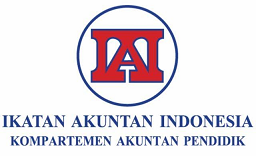STUDI PERILAKU KETIDAKJUJURAN AKADEMIK MAHASISWA AKUNTANSI ERA PANDEMI COVID19 DI BANDAR LAMPUNG
Abstract
The objective of this study is to find empirical evidence on the influence of attitudes, subjective norms, and perceived behavioral control on academic dishonesty, such as cheating and plagiarism, by state university students in Bandar Lampung. Specifically, this study was conducted during the COVID19 pandemic era with online classes and exams. Using the framework of The Theory of Planned Behavior (TPB) by Ajzen (1975) and adopted and slightly modified a questionnaire of Harding et al. (2007) and Stone et al. (2010), responses of 83 students from two state universities in Bandar Lampung were analyzed and tested using structural equation model.
Similar with previous research, this study finds that attitudes, subjective norms and perceived behavioral control influence students’ intention to perform academic dishonesty confirming the TPB. Online classes and exams conducted during COVID19 pandemic, which are included as indicators in perceived behavioral control variable is found to have a positive correlation with the intention to academic dishonesty
Downloads
References
Al-Gahtani, S. S., Hubona, G. S., & Wang, J. 2007. Information Technology (IT) in Saudi Arabia: Culture and The Acceptance and Use of IT. Information & Management, 44 (8): 681-691.
Alleyne, P and K. Phillips. 2011. Exploring Academic Dishonesty Among University Students in Barbados: An Estension to the Theory of Planned Behavior. J. Acad Ethics (9), 323-338. Springers Science, Business Media B.V 2011.
Atmeh, M. & Al‐Khadash, H. 2008. Factors Affecting Cheating Behavior Among Accounting Students (Using the Theory of Planned Behavior). Journal of Accounting, Business and Management, 15, 109‐125.
Beck, L., & Ajzen, I. 1991. Predicting dishonest actions using the theory of planned behavior. Journal of Research in Personality, 25, 285-301.
Carpenter, T. D., & Reimers, J. L. 2005. Unethical and fraudulent financial reporting: Applying the theory of planned behavior. Journal of Business Ethics, 60, 115–129.
Carpenter, D. D., Harding, T. S., Finelli, C. J., Montgomery, S. M., & Passow, H. J. 2006. Engineering students : perceptions of and attitudes towards cheating. Journal of Engineering Education, 95(3), 181‐194.
Chapman, K. J., Davis, R., Toy, D., & Wright, L. 2004. Academic Integrity in The Business School Environment: I’ll Get by with A Little Help from My Friends. Journal of Marketing Education, 26 (3), 236–249.
Chenhall, R. H. 2004. The Role of Cognitive and Affective Conflict in Early Implementation of Activity-Bast Cost Management. Behavioral Research in Accounting, Vol. 16. pp. 19-44.
Davis, S. F. Drinan, P. F. Gallant, T. B. 2009. Cheating in School : What We Know and What We Can Do. Chicester : Wiley Blackwell.
Fishbein, M., & Ajzen, I. 1975. Belief, Attitude, Intention, and Behavior: An Introduction to Theory and Research. Reading: Addison Wesley.
Fornell, C., dan Larcker, S. 1981. Evaluating Structural Equation Models with Unobservable Variable and Measurement Error. Journal of Shop Production, Vol.19, No. 3, hal. 187-193.
Gunadha, Reza. 2021. Ketua Dewan Guru Besar UI: Plagiarisme Dilakukan Mahasiswa hingga Dosen. Kompas online. 15 Februari 2021. 20:28 WIB. https://www.suara.com/news/2021/02/15/202809/ketua-dewan-guru-besar-ui-plagiarisme-dilakukan-mahasiswa-hingga-dosen. Diakses Diakses 25 Juli 2022.
Harding, T.S , Matthew J. Mayhew , Cynthia J. Finelli & Donald D. Carpenter. 2007. The Theory of Planned Behavior as a Model of Academic Dishonesty in Engineering and Humanities Undergraduates. Ethics & Behavior, 17:3, 255-279.
Haswell, S., Jubb, P., & Wearing, B. 1999. Accounting students and cheating: A comparative study for Australia, South Africa and the UK. Teaching Business Ethics, 3, 211–239.
Herzberg. 1959. The Motivation to Work. New York: John Willey and Sons.
Jensen, L. Arnett., Jeffrey J. Arnett., S. Shirley Feldman. 2002. It’s Wrong, But Everybody Does It: Academic Dishonesty among High School and College Students. Contemporary Educational Psychology 27, 209–228. Available online at http://www.idealibrary.com.
Jogiyanto, H. M dan W. Abdillah. 2009. Konsep dan Aplikasi PLS (Partial Least Square) untuk Penelitian Empiris. Yogyakarta: BPFE.UGM
McCabe, D.L. 2005. Promoting Academic Integrity in Business Schools. Paper presented at Professional Development Workshop, Academy of Management Conference, Hawaii, 6 August.
Simkin, M. G., & McLeod, A. 2009. Why do college students cheat? Journal of Business Ethics 94, 441-453. http://doi.org/gb4
Stone, T. H., Jawahar, I., & Kisamore, J. 2007. Predicting Academic Dishonesty: Theory of Planned Behavior and Personality. ASAC 2007. Ottawa, Ontario.
Stone, T., Jahawar, I., & Kisamore, J. 2009. Using the theory of planned behaviour and cheating justifications to predict academic misconduct. Career Development International, 14(3), 221–241.
Stone, T. H., Jawahar, I., & Kisamore, J. 2010. Predicting Academic Misconduct Intentions and Behavior Using the Theory of Planned Behavior and Personality. Basic and Applied Social Psychology, 32:1,35-45. http://dx.doi.org/10.1080/01973530903539895
Whitley, J., B.E. and P. Keith-Spiegel. 2002. Academic Dishonesty: An Educator's Guide. Mahwah, NJ, Lawrence Erlbaum Associates.
Whitley, B. E. 1998. Factors Associated with Cheating among College Students: A Review. Research in Higher Education, 39, 235–274.
Wibowo, Purwo A., Herlina, Dyna dan Mulyani, Sri. 2011. Pengujian Theory of Planned Behavior sebagai Model Prediksi Perilaku Menyontek Mahasiswa. Prosiding Seminar Nasional Psikologi (SEMPSI). Universitas Islam Sultan Agung Semarang.
Yamin, Sofyan dan Kurniawan Heri. 2009. Structural Equation Modeling: Belajar Lebih Mudah Teknik Analisis Data Kuesioner dengan Lisrel-PLS. Jakarta: Salemba Infotek.
http://nasional.tempo.co/read/news/2015/04/16/079658121/Ini-Kecurangan-Ujian-Nasional-2015-Versi-FSGI
Yulianto, Agus. 2022. Kecurangan Akademi Selama Covid-19 pada Siswa SMA di Jawa Barat. Kompas. Rabu, 15 Jun 2022, 16:09 WIB. https://republika.co.id/berita/rdihgd396/kecurangan-akademi-selama-covid-19-pada-siswa-sma-di-jawa-barat%C2%A0. Diakses 25 Juli 2022.

This work is licensed under a Creative Commons Attribution-NonCommercial-ShareAlike 4.0 International License.
Jurnal Akutansi dan Keuangan allows readers to read, download, copy, distribute, print, search, or link to the full texts of its articles and allow readers to use them for any other lawful purpose. The journal allows the author(s) to hold the copyright without restrictions. Finally, the journal allows the author(s) to retain publishing rights without restrictions
Authors are allowed to archive their submitted article in an open access repository
Authors are allowed to archive the final published article in an open access repository with an acknowledgment of its initial publication in this journal







